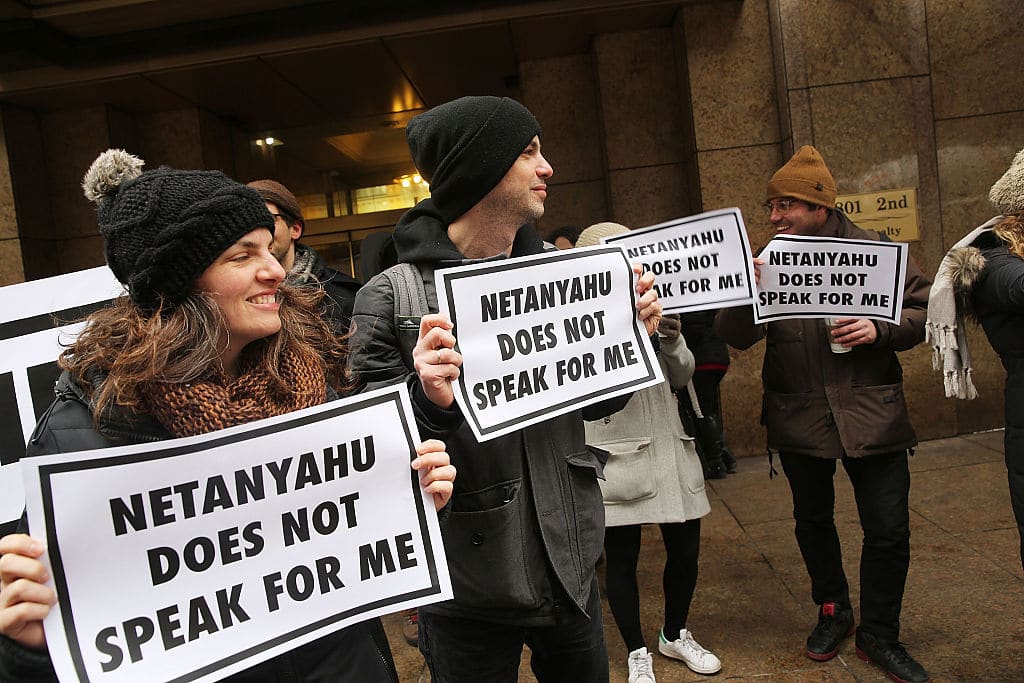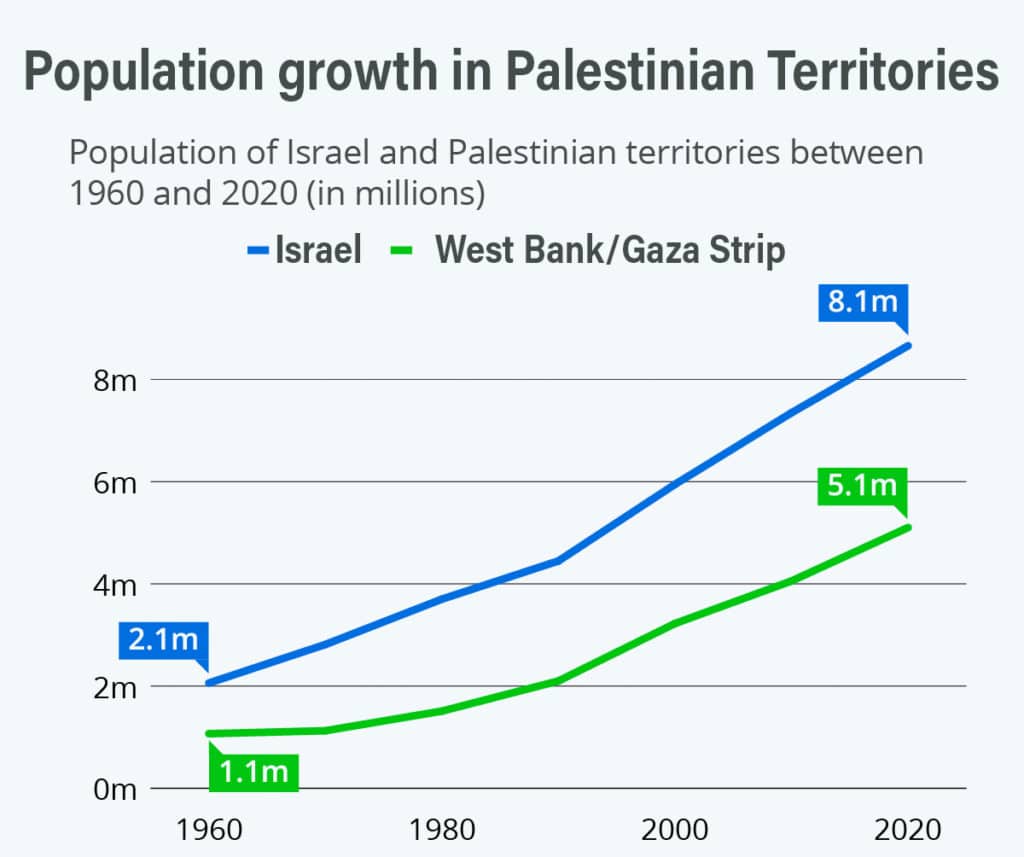Editor’s note: This is part 3 of a multipart series. You can view the entire series here.
Is criticizing Israel antisemitic? It’s a question that confuses many well-meaning people.
Some assume that an attack on the Jewish state must also be an attack on Jews. For instance, evangelical leader Franklin Graham once dubbed criticism of Israeli settlers an assault on God’s “chosen people.”
At the same time, others justify their attacks on Jewish people around the world by pointing to Israel’s actions, claiming that they are only being “anti-Zionist,” not antisemitic.
So what’s the deal?
Is criticizing the Jewish state anti-Jewish? Not quite. In fact, it happens all the time in Israel itself and among Jews everywhere. Just as someone can oppose the policies of the United States, France, China, or Saudi Arabia, they can oppose the actions of the Israeli government. Doing so doesn’t make them a bigot.

Objections to Israeli domestic policies, settlements, occupation, or treatment of the Palestinians are political positions, not antisemitic slurs.
This is true even when the criticism is harsh, controversial, or makes some people uncomfortable. Israel is a country like any other, and it deserves criticism like any other.
If that were the end of the conversation, it would make our lives a lot easier. But unfortunately, it’s not.
Honestly, this just makes me so sad and angry. The vandalism targeting La'ad Canada's anti-hate ads is antisemitism plain and simple. There's no other way to describe this response to a campaign calling for no hate against Jews. 🧵1/2 pic.twitter.com/W9ddyR05f8
— Ya'ara Saks יערה זקס (@YaaraSaks) August 18, 2021
That’s because criticism of the Jewish state sometimes masks animosity toward Jews, and as a result, anti-Israel movements often attract anti-Jewish bigots.
Just look at the web site, “antizionism.org,” which is actually run by neo-Nazi white supremacists.
This is pretty predictable, if you think about it. After all, Israel is home to half the world’s Jews. Having that many of them in one place is naturally going to draw the anger and attention of the millions of people who despise Jews and want them to disappear.
For this reason, antisemites are obsessed with Israel, and it’s one of the biggest excuses they use to rationalize their prejudice.
He identified himself as being from Kan News, how is that unethical? I didn't say "Hi I'm John Kunza from NBC News in America sitting at a desk in Charlotte, North Carolina and I am Jewish" when conducting interviews as a foreign news producer. I said "Hi I'm John from NBC News." https://t.co/5kxSi2Zguh
— Johnny Kunza (@johnkunza) August 19, 2021
In many places, it’s not respectable to openly hate Jews, but it is respectable to criticize the Jewish state, and so bigots will say their problem is with Israel, when their real problem is with Jews.
What does this look like in practice?

First, there’s the obvious stuff. Around the world, antisemites assault Jews and vandalize Jewish schools, synagogues, campus institutions, and even Holocaust memorials over alleged Israeli actions thousands of miles away.
This is just the usual harassment and violence that Jews have experienced for centuries. Israel is simply the flimsy cover story that the perpetrators of these crimes invoke to justify their classically antisemitic actions.
Then you have traditional antisemitic lies that are repurposed as anti-Israel lies.
Blood libel
For example: Back in the Middle Ages, Jews were repeatedly accused of murdering gentile children for perverse purposes. Some antisemites still make this bizarre medieval accusation, known as the blood libel, today. But others have adapted it for the 21st century, with some twisting it into the claim that Israel is perpetrating “genocide” against the Palestinian people.

In actuality, according to the Palestinian Central Bureau of Statistics, the Palestinian population in Israel, the West Bank, and Gaza has skyrocketed since Israel’s founding in 1948.
Whatever one thinks of Israel, that’s obviously the opposite of genocide. This false allegation isn’t a legitimate argument; it’s a blood libel on a national scale–an ugly update of an ancient slander. Take this quote by Hamas Spokesman Osama Hamdan for example:
“The Israelis concentrate on killing children. I believe that this is engraved in the historical Zionist and Jewish mentality, which has become addicted to the killing of women and children. We all remember how the Jews used to slaughter Christians, in order to mix their blood in their holy matzos.”
Jews (Israelis) secretly control the world
This is not the only antisemitic conspiracy theory that has received an anti-Israel face-lift. Take the mother of all antisemitic myths: the idea that Jews secretly run the world. Because it’s frowned upon to say that “the Jews” control the economy or government these days, antisemites instead insist that Israel or its “Zionist” supporters do.

Robert Bowers, the white supremacist who massacred Jews at a Pittsburgh synagogue, claimed that “ZOG” –Zionist Occupied Government–was in control of America’s political parties. So did the Supreme Leader of Iran.
All of these antisemitic ideas rebranded as merely “anti-Israel” are revealing in that they just replace the word “Jew” with “Israel” or “Zionist.”
Singled out
Other instances of anti-Jewish prejudice disguising themselves as anti-Israel arguments are more subtle. These often involve the Jewish state being subjected to criticism leveled at no other non-Jewish country.
Consider the United Nations, whose Human Rights Council has condemned Israel over 70 times in its 14-year history, more than all other countries combined, including vastly worse regimes like China, North Korea, and Russia.
You have to ask, is Israel truly deserving of 86% of the world’s condemnation? Or possibly is something else afoot at the United Nations?”
To be clear, the point here is not that Israel has never committed human rights violations that deserve criticism; it’s that Israel’s violations deserve to be treated like those of any non-Jewish country–but they are not.

Any unbiased observer understands that this is not because Israel is more evil than all other countries, but because it is more Jewish.
This disparate treatment was so egregious that in 2017, the U.S. Senate sent a letter to the U.N. Secretary General, calling on him to combat the institution’s bias against Israel. It was signed by all 100 U.S. senators, from Ted Cruz and Marco Rubio to Bernie Sanders and Elizabeth Warren.
So what’s going on here?
Why is Israel, a country that certainly merits reasonable criticism like any other, attracting so many unreasonable attacks?
Here’s an analogy that helps untangle this: Criticizing Barack Obama doesn’t make someone racist, but as the first black President, he naturally attracted vicious critics motivated by racism. Similarly, criticizing Israel doesn’t mean that someone is antisemitic, but as the world’s only Jewish state, Israel naturally attracts many critics motivated by antisemitism.
Take former mayor of London, Ken Livingstone, a longtime proponent of boycotting Israel, who was expelled from his party after claiming Hitler was actually a Zionist, and insisting “it’s not antisemitic to hate the Jews of Israel.”
Or Alice Walker, the celebrated author and Israel boycotter who refused to allow her novel “The Color Purple” to be translated into Hebrew, and who has promoted bizarre antisemitic conspiracy theories on her blog and beyond for years.
And the list goes on.
Too often, we find that people who level extreme attacks on the Jewish state turn out to harbor ugly views about Jews.
Keep in mind that sometimes a claim can be offensive and wrong without being antisemitic.
A person might just be repeating something misguided they heard from friends or social media, and be speaking from ignorance, not hatred.
The inconvenient truth is that there’s no simple test for determining whether someone is anti-Israel, anti-Zionist, or just plain antisemitic… Anyone who tells you that criticism of Israel or Zionism is always antisemitic, or never antisemitic, doesn’t seriously understand antisemitism.
What’s important is that we be aware that antisemites are drawn to Israel debates… that we are vigilant about rejecting their bigoted baggage… and that we prevent them from corrupting the critical conversation about the Jewish state and its conduct
